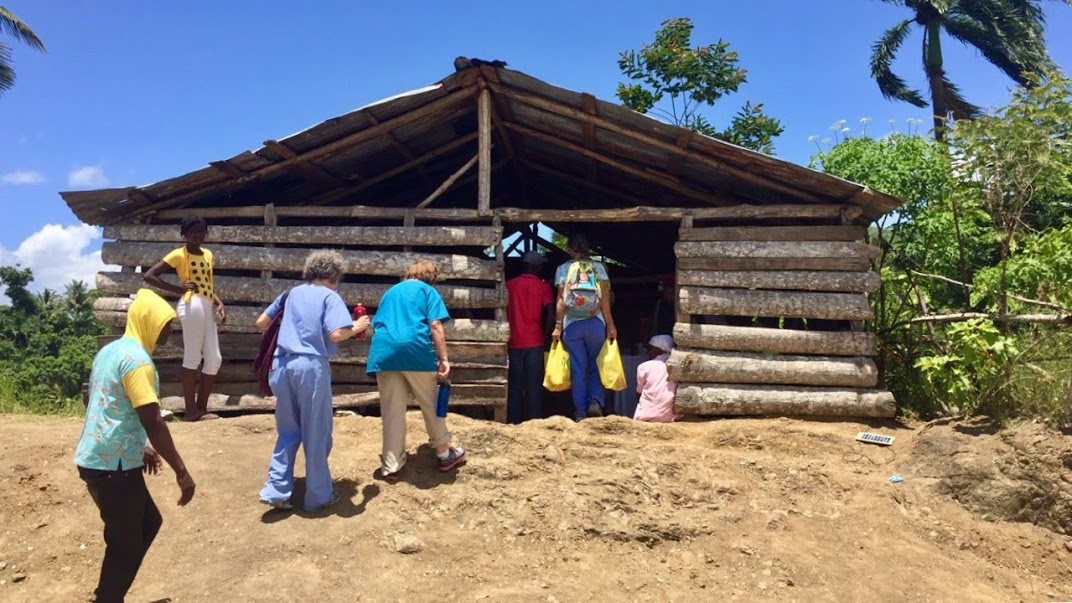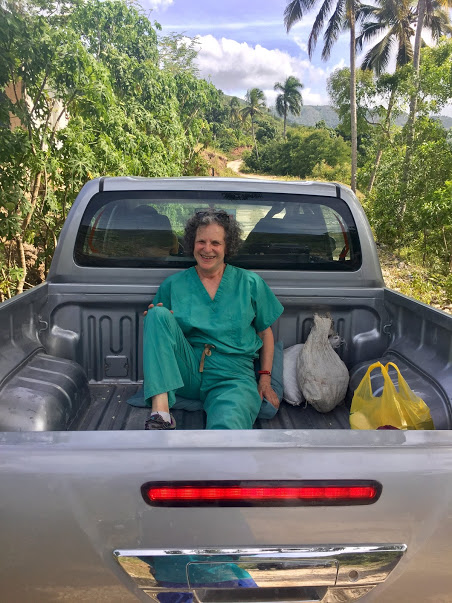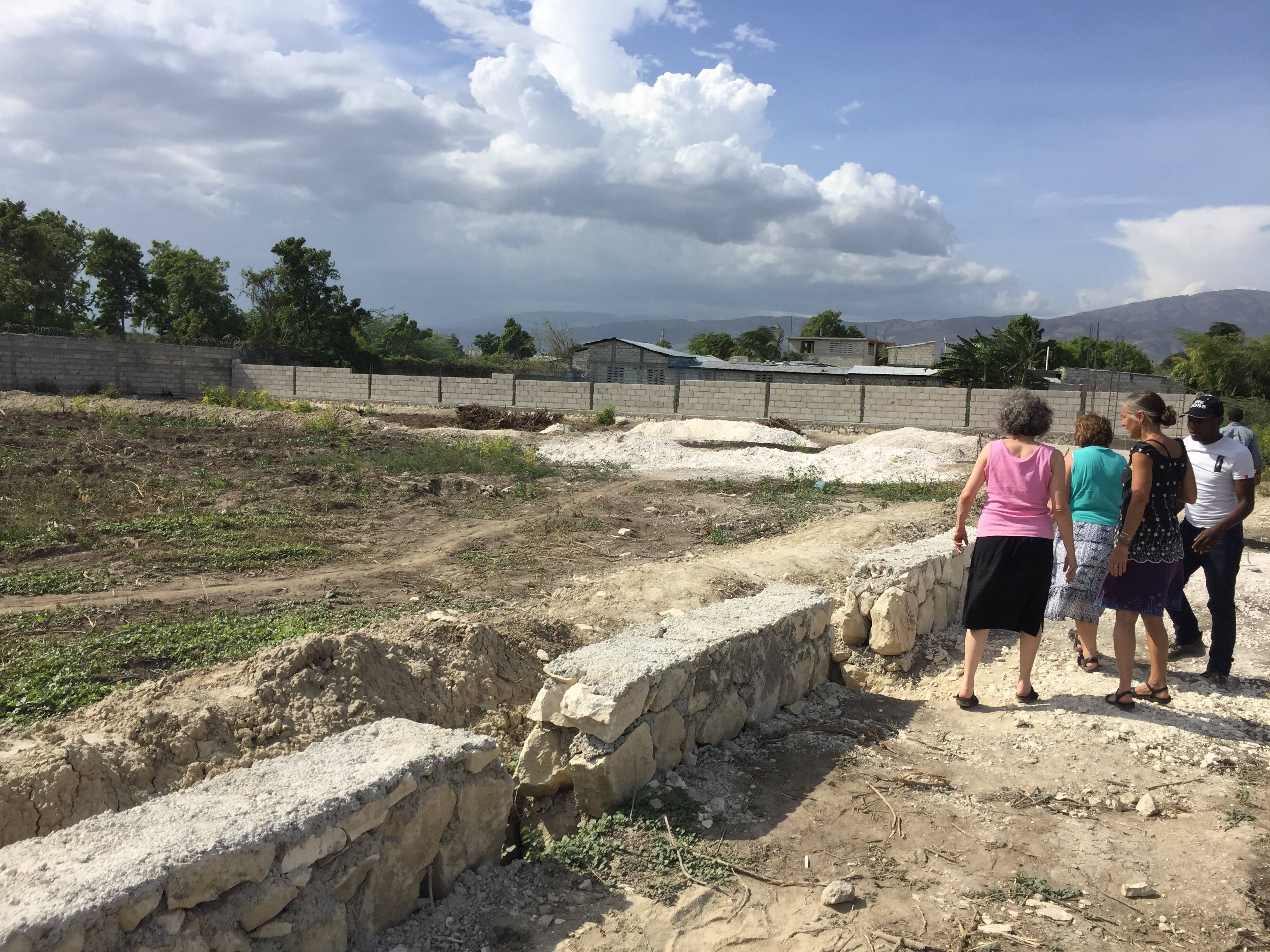Written By Diane Berg, Massachusetts, USA. Photographs by Caroline Ferguson-Dryden.
I am back in Haiti. I didn’t expect to be here again so soon. What has compelled me to return after only two months? I am greeted at the airport by the gauntlet of hundreds of men desperate for work and by a heat that is even more relentless than during my last trip. Is that even possible?
I had been recruited several months earlier by someone who was looking for a nurse-midwife to train “matrons” in helping women to give birth safely. I am remembering those five days spent with twenty-five women and men who had little or no formal training and many of whom were illiterate. Most women in Haiti give birth at home under unimaginable conditions and without any access to hospital care. Hospitals cost money they simply don’t have. Most Haitians do not have the money to buy enough food.
The training included the most basic information about hygiene and nutrition and emphasized how to attempt to deal with various obstetric emergencies at home. The matrons were warm and welcoming, famished for information because most Haitians receive little education. In Haiti, you have to pay to attend school.

The matrons began each morning with a prayer and a song, moving in its intensity. I heard later from our translator that they got a kick out of watching me sway and clap to their music. They laughed easily, especially over our goofy antics when my nurse partner (Alison) and I roleplayed how to handle obstetric emergencies. This richness of spirit was juxtaposed with the reality that while the maneuvers we taught might occasionally help, many mothers and babies will die unnecessarily in childbirth without access to medical backup. “What is this?” I wondered, trying to make sense of this intensely jarring experience.
On this second trip, I would not do any training but would spend all my time seeing patients. Upon arriving at the Partners in Development (PID) compound in Port-Au-Prince with the other members of our team (two nurses and a pre-med student, one of whom was Nancy, a retired nurse from my Sangha) I was put to work counting out two-month supplies of medications. I recall that “Dorothy, you’re not in Kansas anymore” moment on my last trip when I was greeted by the same ten and twelve-year old girls doing this task that is performed in the U.S. by pharmacists. I remember at that moment thinking that the Three Tenets would serve me well in Haiti, that it would be important for me to suspend all expectations and judgments, and to simply bear witness to whatever presented itself in this place so different from anywhere else I’d ever been.
The next day we travel to a town in the southern part of Haiti that will serve as our base for the following three days. We set up a clinic in a tiny church with a rusted tin roof in an isolated mountain village. To get there, we traveled in pickup trucks on rutted, rocky paths that pass for roads and crossed two rivers. On my previous trip, we had to cut the clinic short when the water began to rise in one of the rivers after a torrential rainstorm. Our driver warned that we would soon be unable to cross the river by truck if we waited any longer. And in fact, when we crossed the river, there was a terrifying but thankfully brief moment when the truck’s tires were no longer in contact with the river bed and the truck was afloat…(no expectations, no judgment…).

Due to their isolation and poverty, most of the people in the area had never seen a health care provider until PID began this mobile clinic after the hurricane last fall that devastated parts of Southern Haiti. Among a myriad of health problems, it was discovered that about 40% of the people in the area suffer from moderate to severe hypertension (some with absurdly high blood pressures) and because they have received no treatment, a number of people had had strokes.
We bill ourselves as a hypertension clinic, but everyone with any physical problem – from infants to the elderly – walk hours to see us since we are the only game in town and we are free of charge. Every morning, the pastor of the church begins the clinic with a prayer. One morning, a young woman also gets up and offers a lengthy prayer. I don’t understand her words as she is speaking Haitian Creole but I assume it is the usual religious fare. Later I am told that the woman repeatedly thanked God for sending us to her community and for the help we are providing and for the fact that we continue to return every two months. I am deeply moved. “You’ve got to watch those assumptions, Diane,” I remind myself. “Try to remember to go back to that ‘not knowing’ place.”
Foreign aid and relief workers poured into Haiti in the aftermath of the earthquake but then everybody left. It seems that the only “Blancs” [Editor’s note: “Blancs” is a local nickname for white-skinned people] in Haiti these days are the evangelical missionaries who are here only to save souls. I am starting to understand that what is most precious to the Haitian people we meet, more than even the material help we give (a drop in the seemingly bottomless bucket), is that we are here and that we care. I am reminded how bearing witness from a “not knowing” place frequently is the loving action itself. Just showing up is what matters most.
We treat the medical problems of the people who come to our ramshackle clinic as best we can despite our limitations – no electricity, no running water, no lab tests, no technology, a limited supply of only a limited variety of medicines. We treat people for high blood pressure, urinary tract infections, sexually transmitted diseases, worms, malaria and pervasive complaints of skin rashes and gastrointestinal distress due to the unhygienic living conditions and a lack of clean water. On the first day I see a patient that continues to haunt me – a young man with a severely distended abdomen in significant pain. He looks like he is in his eighth month of pregnancy. I have no idea what the problem is but I can see that it’s serious and I wonder if he has some kind of cancer. I give him Tylenol and ask him to return on the third day when a Haitian doctor will be joining us. The doctor tells the young man to go to the hospital in the nearest town but how likely is it that he will actually go? Even if he can find a way to get there, how likely is it that he has the money to pay the hospital?
We return to Port-Au-Prince where I will spend several days seeing patients in the free clinic that Partners in Development runs in a very poor section of the city. The heat is unrelenting, as is the stream of patients whose needs are so great. I continually remind myself that if I can do little else, I can still bear witness and I keep telling myself that is no small thing. The first night, we go for a feast at the home of the family of one of our translators, Maxime. We have supplied the funds to buy the ingredients and the food is fantastic. Afterwards we walk to a tiny “bar” around the corner where we dance the national dance called the Kompa.
Soon after I arrived in Haiti for the first time, I began to feel an irresistible impulse to dance and so Maxime decided that he would have to take me dancing. A group of us had gone to this same bar where he taught me how to do the Kompa. The dance is slow and sensual and looks a lot like having sex on the dance floor when done well. I’m afraid I did the awkward Blanc girl’s rendition but I didn’t care how I looked. That is another great thing about Haiti — how free I feel to be who I am.
After the clinic on the second day, we go to see the land. During the last trip, Alison took me to a meeting with Maxime, his father– who is the social worker for the PID clinic –and several other Haitians about their dream of building the first homeless shelter in Port-Au-Prince. Three million people became homeless after the earthquake and hundreds of thousands remain so. Mr. Genois, the clinic social worker, had been looking for land for such a project for months in Port-Au-Prince where land for purchase is extremely hard to find. Everyone at the meeting spoke about their vision for such a project– providing temporary housing for homeless families, serving as a community center, planting a community garden and making micro-loans for families to start their own small businesses in order to become self-sufficient.
A week after we returned home from Haiti [last time], Maxime called to say that a prime piece of land had that day been put up for sale and if we didn’t act immediately, it would be sold by the end of the day. So Alison and I had raided our retirement accounts and wired the money to Haiti to make a deposit on the land. We posted a “Go Fund Me” for the project and were able to raise some money to begin constructing a wall around the land. I learned that in Haiti, land can be sold out from under you if you don’t put a wall around it and there were already signs that this might happen.
Now, we finally get to see the land. It is lovely, and in a prime location as well as a sweet neighborhood with a school and a church nearby. We had sent Maxime enough money to build the foundation for the wall but it is clear that we need to raise more money to finish the wall, as well as to pay the balance on the land itself.
On our last day in the clinic, PID sends out an old bus to ferry people from another part of the city to our clinic. The people who live in that area are the poorest of the poor. They live in what are essentially lean-tos on a garbage dump without any electricity or clean water. Because I am a nurse-midwife, many of the patients with “female complaints” are directed to me. One nineteen-year old woman who lives on a heap of garbage with her ten-month old baby tells me that she has been having her period irregularly. I send her to the clinic’s tiny lab for a pregnancy test and it turns out that she is pregnant. The woman begs me to terminate the pregnancy. I ask the Haitian staff where I can send her and am told that abortion is not legal in Haiti. The young woman breaks down sobbing when I say there’s nothing we can do to help her end the pregnancy.
The last patient I see is a woman who has been bleeding very heavily. It turns out that she is also pregnant and likely having a miscarriage. The Haitian doctor tells the young woman to go have a sonogram but we both know that won’t happen. I worry what will become of her. Will she bleed to death?
By the end of the day, I am flattened by the heat and the heartbreak. I go back to the bunkhouse to take a cold shower which is always the most pleasurable moment of the day. I am in a half-dressed state when there is a knock on the door. It is the Haitian doctor accompanied by a translator since he does not speak English. He has come to say goodbye and to give me two bags of Haitian coffee. I had mentioned to him that I really liked the coffee in Haiti. I don’t know what to say. I keep grabbing at my heart. My heart goes from broken to full in an instant. “This is it,” I think. This is everything.
 Diane Berg has been a nurse-midwife for most of her career. She recently worked as a hospice nurse. She practices with Roshi Eve Marko at the Green River Zen Center in Western Massachusetts. She can be reached by email at dianeberg7@ gmail.com. Please contact her if you are interested in getting involved in work in Haiti. You can make a donation to the Haiti Homeless Shelter Project through Partners In Development, 174 High Street, Ipswich, MA 01938 (or online at here), and indicate that funds are to be used for this specific project.
Diane Berg has been a nurse-midwife for most of her career. She recently worked as a hospice nurse. She practices with Roshi Eve Marko at the Green River Zen Center in Western Massachusetts. She can be reached by email at dianeberg7@ gmail.com. Please contact her if you are interested in getting involved in work in Haiti. You can make a donation to the Haiti Homeless Shelter Project through Partners In Development, 174 High Street, Ipswich, MA 01938 (or online at here), and indicate that funds are to be used for this specific project.



